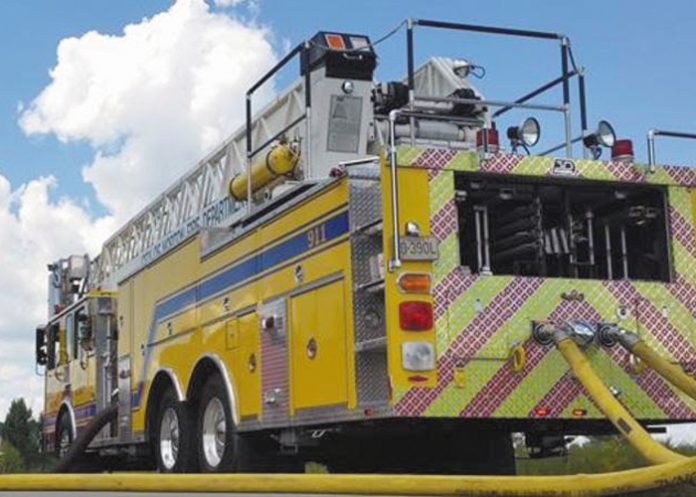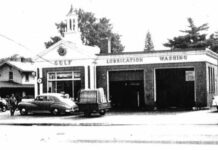By Robert Bravender
There are all sorts of niche markets in the auto repair trade — diesel, small engines, European imports — but the one with the highest visibility is perhaps the most overlooked: emergency vehicles. A particularly high level of service is required for fire engines and ambulances, and as it turns out, not everyone can do it.
“They had this at a regular repair shop,” said Paul Moss, gesturing at a medium-sized fire truck from a regional department. Along with his wife, Lisa, Moss is co-owner of Alpha & Omega Repair Service. Opening an access panel behind the cab, he revealed the heart of the unit, the powerful water pump for the fire hoses.
“[That shop] left the truck outside overnight. The water in the pump froze and cracked the fittings. You just can’t do that with these trucks,” he said.
“You have to know how the pump works, know about hydraulics, about aerial devices like ladders and buckets,” Moss remarked. “With emergency vehicles we do a lot of PMI — preventative maintenance inspection. That’s a yearly thing on fire trucks, but ambulances we do about every 3,000 to 5,000 miles, according to how the customer wants to do it. Ambulances are run a lot; fire trucks may not have 5,000 miles on them in a year.”
Besides the PMI and DOTs, Alpha & Omega does annual water pump tests on fire trucks with a towable tank they built themselves.
“The pumps are tested for volume and pressure when they’re manufactured, and they have to maintain those numbers throughout the life of the truck,” Moss explained.
“We hook a six-inch intake to my tank, which can hold 3,000 gallons of water,” he continued. “The fire truck pulls its prime, so gravity pushes the water into the pump. Once we get that started, I shoot the water out of the fire truck through the hose into the deck gun right back into the tank, and it keeps circulating back and forth. We monitor certain pressures at gallons per minute.”
Bottom line: in this particular niche market it really helps to have a background in firefighting. Starting as a volunteer firefighter at age 15, Moss got into diesel repair around the same time and pursued it into trade school. He eventually got a job servicing heavy equipment for a strip mining company near his hometown of Clintwood, Va., doing ambulances on the side.
“[The local departments] had taken them to several places and couldn’t get them fixed, and we fixed them,” said Moss. “That’s how it started, working on air conditioners and electrical, two biggies on ambulances.”
Unlike automotive repair, nearly all fixes have priority for the companies, counties and municipalities that run these emergency vehicles.
“Of course, everybody’s got a budget that they have to live by, but for the most part these are emergency vehicles, so they want them right,” he observed. “There are a few that might get into a bind every now and then, and they may have to prioritize, but for the most part our customers want their stuff fixed right. You know when the bell rings and these trucks go out, people’s lives depend on them.”
The Clintwood branch of Alpha & Omega officially opened in 2010, where Moss concentrated on servicing industrial fleets.
“We actually go up on mine property and work on support vehicles — lube trucks, performance trucks, powder trucks,” he said. “We also do work for a tree company. And we do all of the vehicles and equipment maintenance for the town of Clintwood.”
But then in 2016 Moss got a dream offer — full time firefighter in Bristol, Va. A city about an hour and half away on the Virginia/Tennessee border, Moss figured he could still run the Clintwood shop during his off days. But once in Bristol, his reputation for work on emergency vehicles quickly caught up with him.
“I loaded up a trailer with tools and started going around working at different fire departments and rescue squads in this area,” laughed Moss. Soon he leased a location in Bristol, Tenn., and opened his second Alpha & Omega shop; this one focused more on emergency equipment. But he kept the concept of the trailer; it eventually evolved into a mobile unit.
“The rural areas have volunteer fire departments, and they don’t have time to transport units back to us, so a lot of people would prefer to pay us to come to them,” Moss explained. “They don’t have to worry about transport, about the equipment, knowing everything is safe at their place. If we’ve got time we also do some roadside assistance; we get all kinds of calls from people on I-81; 18-wheelers, bigger trucks, some RVs.”
Between them, the two locations cover about 200 miles along the Interstate 81 corridor, going from Sevierville, Tenn., north and east to Pulaski, Va., as well as west into Kentucky.
Other than the mobile tank tester, Alpha & Omega has diagnostic tools for the engines, transmissions, ABS — “even the wiring since they went to Multiplex,” he added. “They’ve got nodes all over the truck. It’s less wire, but you’ve got to have a special computer to do diagnostics on that.”
While the Clintwood store is smaller at about 1,200 square feet, most of the work is mobile, although Moss has plans on doubling that facility’s size. It has three mechanics and one secretary, with one technician dedicated to the strip mining job. The Bristol location is bigger at 4,500 square feet, and currently has two secretaries, his wife as the office manager, and three technicians.
To enhance his position in the emergency vehicle market, Moss also made sure his staff is not just ASE-certified, but certified as Emergency Vehicle Technicians (EVT); a recommendation from the National Fire Protection Association (NTPA), a trade organization for the fire prevention and fighting industry.
“The EVTs mostly test your knowledge of rules and laws suggested by the NFPA, like what class of a leak will cause a vehicle to be taken out of service,” he explained. “We require all of our technicians to get some sort of certification. Not everybody is a master tech, but according to what their main job performance is we require them to get certifications in that area,” said Moss. “We have the jobs somewhat broken down into specialties; everybody’s got their niche.”
However that makes this market quite challenging.
“It opens up a whole new world of training,” acknowledged Moss, “because when you’re talking pumps, that’s a whole other certification process. You’ve got three main manufacturers of fire engine water pumps and they all have their own schools to go to. Add to that the different fire truck manufacturers, which have their own schools.”
Despite this training regimen, or perhaps because of it, Moss has diversified over the years. As a diesel expert it was only natural that he became a Jasper engine dealer, with all that involves. They’re also an authorized Spartan R.V. service center, since Spartan manufactures chassis for both motorhome coaches and fire trucks.
“Spartan didn’t have anyone in the area committed to doing their R.V. work,” Moss said, “so they had us go ahead and get certified. Now we do their warranty work, and just because we’re on their website we get a lot of R.V. work coming in here.”
They also have a dealership license to sell ambulances for Excellance, fire trucks for Spencer, and Warner truck bodies. “Most of time people come in and spec out the truck they want,” he said of the process. “I send the specs to the manufacturer, who makes sure they meet all the NFPA requirements, send back drawing to be proofed, and then they’ll start making the truck. Finally we pick it up and deliver it to the customer.”
Of course the pressure of maintaining two shops an hour and half apart is also a bit challenging for Moss.
“Yesterday I was actually in Clintwood,” he admitted. “But I’ve got some really good employees up there. Here I’m still a fireman with the city of Bristol, and those seven or eight days a month when I’m there doing a 24-hour shift puts a strain on things. If issues arise it’s hard for me to deal with them while there.
“So I’ve given my notice,” he concluded. “This business has grown to the point where I can’t manage both shops and work at the fire department. I’ve been blessed to be a fireman; it’s the best job in the world, but after a lot of prayers we’re going to go with this business fulltime.” •



